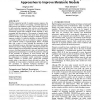336 search results - page 16 / 68 » Building Large Knowledge Bases in Molecular Biology |
APBC
2003
13 years 11 months ago
2003
Nowadays, biologists use a number of large biological databanks to find relevant information for their research. Users of these databanks face a number of problems. One problem i...
BIBE
2006
IEEE
14 years 3 months ago
2006
IEEE
We show how chemical background knowledge can be used to improve the prediction performance in structureactivitity relationships (SARs) for non-congeneric compounds. The goal of t...
DESRIST
2010
Springer
14 years 2 months ago
2010
Springer
Enterprise architecture (EA) describes the fundamental structure of an organization from business to IT. EA as a practice as well as a research topic has been around for several ye...
ISMB
1994
13 years 11 months ago
1994
Homologydetection in large data bases is probably the most time consuming operation in molecular genetic computing systems. Moreover, the progresses made all around the world conc...
CLADE
2008
IEEE
14 years 4 months ago
2008
IEEE
With the exponential growth of complete genome sequences, the analysis of these sequences is becoming a powerful approach to build genome-scale metabolic models. These models can ...


